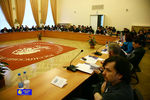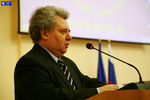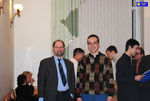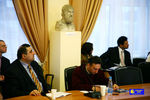On the 1st – 2d of February 2008 the sixth general conference "Political science and political processes in the Russian Federation and the Newly Independent States of post-Soviet Eurasia" took place in the Russian State University for the Humanities (RSUH). The conference was organized by the RSUH, the Information and analytical center for the study of socio-political processes in the post-Soviet space of M.V. Lomonosov Moscow State University and the Eurasian Political Studies Network (EPSN).
On the 1st – 2d of February 2008 the sixth general conference "Political science and political processes in the Russian Federation and the Newly Independent States of post-Soviet Eurasia" took place in the Russian State University for the Humanities (RSUH). The conference was organized by the RSUH, the Information and analytical center for the study of socio-political processes in the post-Soviet space of M.V. Lomonosov Moscow State University and the Eurasian Political Studies Network (EPSN).

At the plenary meeting the moderator, general manager of IAC (Information Analytic Center) M.V. Lomonosov Moscow State University, professor of post-Soviet foreign countries department, the RSUH, Alexey V. Vlasov, marked that the delegates from all post-Soviet foreign countries, with the exception of Georgia, take part in the conference as well as the United States, Great Britain, the Czech Republic, Estonia.
In the welcoming speech the rector of the RSUH, Efim I. Pivovar thanked all the participants for the systematic and scrupulous work at studying different aspects of history and modern development of post-Soviet foreign countries. He noted that at our university a great attention is paid to important areas such as political science, sociology, international relations in the near abroad. The department of post-Soviet foreign countries (originally - education and research center for the study of post-Soviet foreign countries) has already been operating for two years in the RSUH, and therefore the great interest of the University to the conference is appropriated. The rector thanked foreign experts, have attended the conference and reminded that one of the most important conditions for the full and objective examination of the concerned range of problems is the joint operation, the exchange of views and knowledge, the development of cooperation in humanities research.
The chairman of Advisory board of the Eurasian Political Studies Network, professor of the division of Politics and International Relations at the University of Kent (Kanterbury, UK), Richard Sakwa thanked the RSUH for the opportunity to hold the sixth conference within the walls of one of the leading humanitarian centers in Russia. He stressed that the main challenge for the organizers of the conference is development of scientific research, strengthening and expansion of contacts and cooperation between scientists from different countries and regions.
The chair of the department of Comparative Political science, Moscow State Institute of International Relations (MSIIR-University) the Ministry of Foreign Affairs (MFA of the RF), Mikhail V. Ilyin presented the report on the theme "Baltic-Black Sea system in the past and the present". He told about the history of the region since ancient times to the present, about his role in the system of relations "Europe - Eurasia". Mikhail V. Ilyin noted that the Baltic-Black Sea system is not just a "bridge" between Europe and Eurasia, but the center of gravity of different political forces and economic competition.

Richard Sakwa devoted his report to the modern geopolitical system, the reasons and circumstances of crises in contemporary international relations. He noted that at the present often we can hear about the beginning of a new "Cold War" from experts and politicians and designated the "non-central" end of the Cold War of the past century as the fundamental cause of such approach. He admitted that after the collapse of the Soviet Union (USSR), Russia has been unable to take place appropriate to its potential in a new world system, and a number of contradictions with the West have remained on the agenda. The professor also noted the existence of crises in the European Union, which expanded losing original unity. He noted the existence of many intellectual and cultural challenges of the modern world and admitted that over the past twenty years many serious challenges remaining since the "Cold War" had not been resolved.

The President of the Russian Political Science Association Alexander I. Nikitin told about the modern nuclear and military policy of Russia. He reminded that the term of the Strategic Arms Reduction Treaty (START-1) expires in 2009, and START-2 has not yet entered into force, while the mechanisms of verification of disarmament, which had been worked in 1990s, today are ignored. Alexander I. Nikitin recognized the dangers associated with the development of new nuclear weapons round: all the nuclear powers - both old and new - can return to the large-scale nuclear tests, the threat of nuclear terrorism is growing. The speaker stressed that it's necessary to maintain period agreements on the disarmament and the ban against nuclear tests, to take measures for opposition of the environmental threat and the threat of nuclear terrorism.

The dean of the division of Sociology in the RSUH, corresponding member of the Russian Academy of Sciences (RAS), Jan T. Toshenko reported "The relationship of power and religion in the post-Soviet space". He pointed out that religion in the modern world is a serious ideological weapon in the political struggle, including the post-Soviet space, and the question of the interaction of church and state remains open. Defining the development of relations of authorities and church in post-Soviet countries - as Orthodox or Islamic, Jan T. Toshenko stressed that since the end of 1990s the Protestant Church has been increasingly developing, the number of people interested in Occultism has been growing. He noted such an alarming sign, as attempts of religions' ranking, stands one religion to the detriment of other, and warned against the negative religious factor of identification in the system of relations "one's own - somebody else's".
In conclusion of the plenary meeting the director of the Eurasian Political Studies Network Vitaliy N. Merkushev thanked the RSUH for the opportunity to hold a conference in the university. He told about the development of the, called to overcome the dissociation of political scientists from different countries and to unite all the people involved in political research. Vitaliy N. Merkushev stressed that EPSN tasks the following problems: integration and supporting the work of experts and analysts, establishing personal contacts between experts from different countries. He noted that every year there are new topics which researchers are interested in.
The presentation of the project "Mechanisms for creating a positive image of Russia in the post-Soviet Eurasia" took place within the framework of the conference. The present project was prepared by the Information and analytical center for the study of socio-political processes in the post-Soviet space of M.V. Lomonosov Moscow State University, the department of post-Soviet foreign countries and the Eurasian Political Studies Network. The general manager of IAC (Information Analytic Center) M.V. Lomonosov Moscow State University, professor of post-Soviet foreign countries department, the RSUH, Alexey V. Vlasov was among the authors of a scientific monograph, that had brought to the conference participants' attention.
The main conceptual approaches to the formation of the image of the country are considered in the monograph addressed to representatives of government management, as experts on public relations, political scientists, sociologists, as well as all interested in the problem of the Russia's image; also the factors affecting the positive and negative perceptions of Russia in the post-Soviet Eurasia are analyzed in the book.
The conference continued in the framework of the break-out sessions: "The quality of democracy and state power", "Electoral politics", "Legal aspects of the political process", "Human Rights", "Civil society and State ","Migration processes", "Ethnopolitical Challenges", "The influence of external factors on the formation of political processes in the post-Soviet Eurasia", "Energy policy and security in the post-Soviet Eurasia".
Round-tables were organized on the themes: "The Republic of Belarus: the contours of national identity and national political spectrum" and "The power and society in the countries of the Central Asian region".
Richard Sakwa particularly said: "The Conference, held at the Russian State University for the Humanities, in my view, was a significant event in the field of research, devoted to the modern development of the countries in the post-Soviet Eurasia. I am very grateful to all the organizers of the event for the opportunity to visit Russia and listen to interesting speeches on various issues.
The participants of the conference demonstrated the high level of professionalism, deep knowledge of the concerned range of problems. There was a valuable opportunity to discuss the declared themes in the frameworks of the round tables, where the free exchange of views, the analysis and comparison of instances and the whole theory took place.
I would like to make a special mention of the effective activity of the rector and chair of the Department of post-Soviet foreign countries in the RSUH, Efim I. Pivovar, the general manager of the Information Analytic Center M.V. Lomonosov Moscow State University, Alexey V. Vlasov, as well as all staff of these centers for the formation of scientific and analytical school, involving studies of modern social and political development of states in the post-Soviet Eurasia".